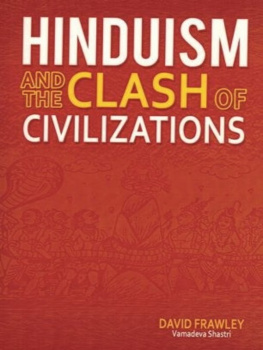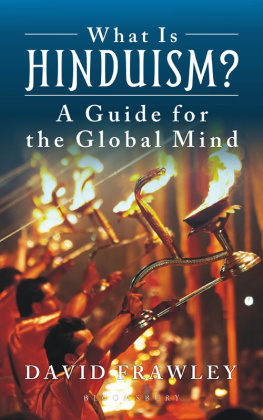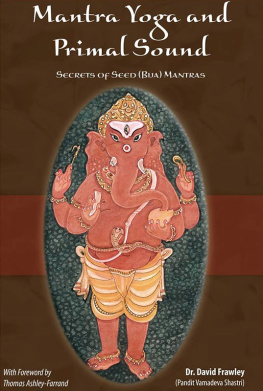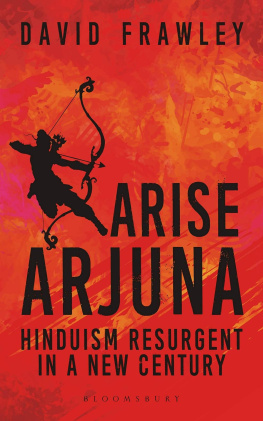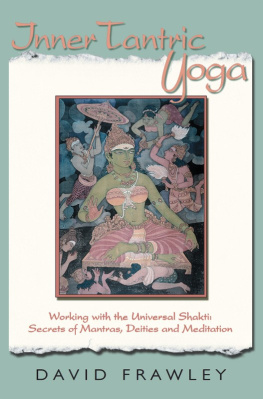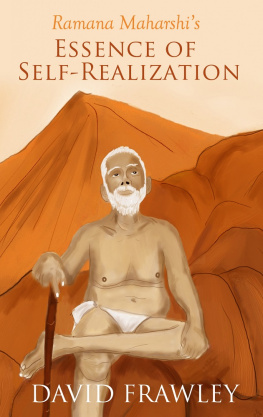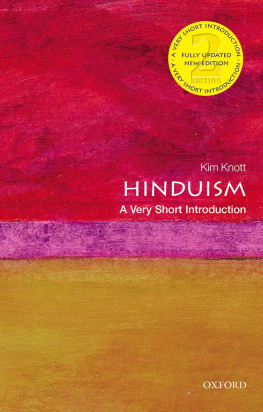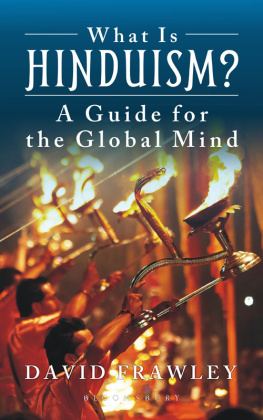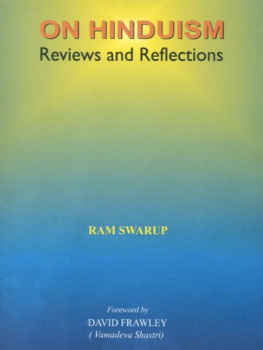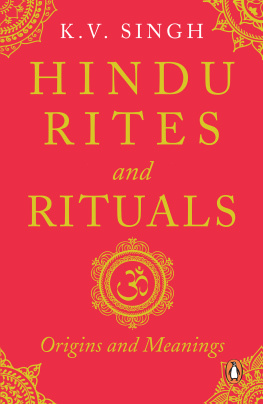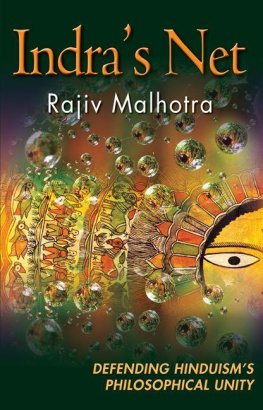Foreword
By Aidan Rankin, Ph.D.
I first became aware of David Frawleys work earlier this year when I was at the University bookshop in Bloomsbury, near to my London home. It used to be called Dillons and owned by a long-established and worthy firm. Now it is Waterstones, a thrusting success story of modern entrepreneurship. No longer a traditionally British bookshop, staffed by friendly amateurs, Waterstones has all the characteristics of a giant American emporium: glossy, squeaky-clean and staffed by indifferent, overworked students. Like its American counterparts, it is replete with self-help guides for stressed male executives and bitter, miserable career women, both products of a disturbed society. In the basement, a bar serves caffe latte, chocolate muffins and a bewildering variety of fruit juice. Waterstones, in other words, is a microcosm of the global monoculture, that spiritual and economic malaise which Frawley so incisively explores. Yet beneath all the gloss, there persist many of the qualities of a fine English bookshop, where rich gems of scholarship of scholarship and wisdom come to unexpected light, just as rich traditions of spiritual insight still withstand the modern Fetich of the market.
Exploring the Eastern Religions section, I came upon a book by David Frawley, or Pandit Vamadeva Shastri, to give him his true name. It was entitled From the River of Heaven: Hindu and Vedic Knowledge for the Modern Age. Whilst glancing at it, I got talking to a silver-haired Indian, a distinguished-looking fellow in an impeccable pinstriped suit. He told me that he was an engineer, and an atheist, but that Vamadeva Shastri was a religious teacher he respected and who told the truth. He was a true Vedacharya, or teacher of ancient Vedic knowledge, and not a Western dilettante jumping on fashionable Orientalist bandwagons. His words confirmed me in my decision to buy the book. Since then - and it was only earlier this year - David Frawley has become for me a source of knowledge and wisdom, a teacher and valued friend. His exploration of the Vedas is intellectually rigorous but accessible, humane but making no compromises with the crocodile-tear compassion and phoney political correctness of Western liberals.
Frawleys embrace of Hinduism - and the Vedic teachings at its core - is wholehearted and at the same time non-dogmatic, as dogmatism is quite alien to the Hindu dharma. Vamadevas teachings have confirmed a suspicion that I have long held, although I am a political scientist by training: that the root of our problems, as a society, is not political as such, but spiritual. This means that much of modern political activity, especially single issue campaigns for minority rights, gay rights, womens rights, etc., is superficial and deeply unsatisfying. It is just another form of consumerism, by which politicians confer group rights as advertisers dream up niche markets. True political activity requires an awareness of the sacred, of the connection between humanity and the rest of nature. True empowerment requires a surrender of power, or rather the acceptance of a holistic world-view, which understands that all life forms are interconnected. Many indigenous religions possess (or possessed) this insight, including Native American spirituality and the pagan religions of old Europe. The latest insights of modern physics and biology also reject the modern ideas of mechanistic progress and humanity as the centre of the universe. Yet the eternal dharma of Hinduism, whose rishis or seers the Greeks admired from afar, provides the strongest, most consistent critique of materialism. It is the philosophical tradition best adapted to our post-modern age.
In Hinduism and the Clash of Civilizations, Vamadeva calls for the Indian culture he loves to reassert itself against the failed ideologies of the West: state socialism and global capitalism. He lambastes the official intelligentsia of post-independence India for eschewing their own culture and turning to Western, mechanistic dogmas, from Marxism to neo-liberalism. Whether they worship the State or the Market, such intellectuals dishonour their countrys noblest traditions. They are as craven as those American and British academics who place politically correct considerations before the pursuit of truth and intellectual freedom. In the best of Indian popular culture, however, Frawley finds an integrity, a latitudinarian tolerance and a connectedness to nature lacking in intellectual circles - and lacking in Western civilisation today.
Crucially, Vamadeva also sees a connection between the universalist assumptions of Western monotheism, which underlay the colonial adventure, and the actions of Westerners today. For whether they are Christian evangelists or secular developmentalists, todays Western missionaries adopt the language of human rights and equality. What they really mean are Western (i.e. consumerist) ideas of rights and a process of cultural levelling down. In liberal capitalism and state socialism, there is no respect for either biodiversity or cultural diversity. Traditions of scholarship and craftsmanship are vilified, local environments polluted, local economies disrupted and local choice eliminated - all in the name of standardisation and progress. These simplistic ideologies of progress are based on commercial expediency and the bureaucrats love of power. However their roots are to be found in the missionary impulse, the doctrinaire certainty that is the Christian traditions negative aspect.
Hinduism, by contrast, offers true universalism, that is to say unity-in-diversity. In the Hindu dharma, the individual can approach the divine in his or her own way. The eternal truth is the same truth, but can be pursued by different means, according to personal or cultural preference. Hindu economics is based on local production for local need, a principle to which the green movement now looks. Mahatma Gandhis concept of swadeshi restores economics to its original meaning of good housekeeping. Swadeshi is based on the village economy, pride in local craftsmanship and self-sufficiency. Rooted in Hindu philosophy, it offers a humane alternative to the failed socialist planning of Nehru - and the ascendant Coca Cola capitalism, the iniquities of which become more apparent every day. Similarly, the ethical teachings of the Vedas provide for a healthy balance between masculine and feminine principles, to the advantage of both and the detriment of neither. Above superficial rights for individuals or groups, Vedic teaching exalts our responsibilities - for each other, as human beings, and to our fellow creatures who have souls as we do. Hinduism gives spiritual underpinnings to the new wisdom of Deep Ecology and the revelations of modern science.
Vamadevas new book is angry in places, and rightly so. He decries the great injustice done to Hinduism, by Islamic and Western invaders, by missionaries old and new and by an Indian elite who have made a new religion of secularism. He is angered and saddened also by the corruption of Hindu social customs, such as the caste system, which was originally a fluid rather than a rigid hierarchy and was about division of labour and not disparity of wealth. That anger, however, yileds quickly to a spirit of boundless, inspiring optimism. Hinduism has survived its historical tribulations and is finding a new voice in world affairs. The twenty-first century BCE could well be the Hindu Moment, in which a revived sanatana dharma gives coherence to the ecology movement and satisfies the New Age seekers of the West. India, land of the Divine Mother, will once again be a beacon for the world.
East is East and West is West and neer the twain shall meet. So, famously, wrote Rudyard Kipling. But David Frawley/Vamadeva Shastri has proved him wrong. His writing straddles that artificial divide to open our minds and hearts to Vedic truths. Like Sri Ramakrishna, Aurobindo or Ramana Maharshi, Vamadeva Shastri is a modern seer. It is therefore a great honour to commend his book.

